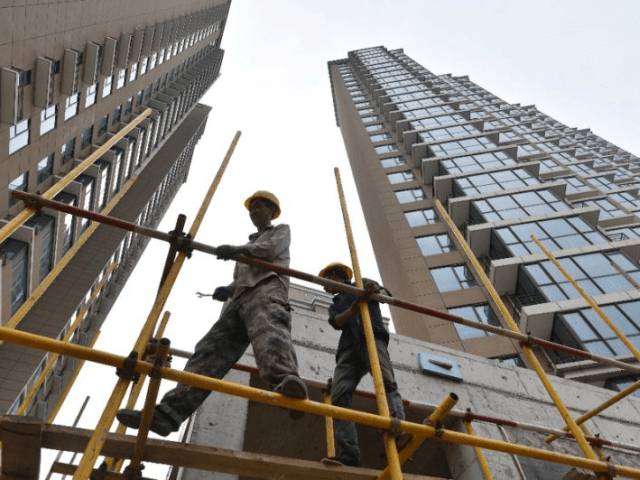China’s looming real estate crisis loomed even higher this week, as property investment slumped, new construction suffered its worst slowdown in a decade, and foreign analysts noted the cash flows of property developers have largely dried up.
The crisis is not just about deeply troubled property giant China Evergrande, although its long-feared collapse would be devastating all by itself. Evergrande is undergoing a new round of audits, the new auditors think the old auditors might have cooked the books, and a major Chinese mutual fund just valued Evergrande’s stock at one penny per share.
The value of other major Chinese real estate firms has been slashed by up to 70 percent over the past quarter, particularly firms suspected of auditing irregularities like Evergrande.
“Everyone except state-owned enterprises is in survival mode,” a senior official at a Chinese property firm told Reuters on Monday.
“We’re all waiting for a recovery and trying to speed up sales and reduce costs and buy less land. But at the end of the day, sales depend on the end users,” the official said.
As Reuters explained, one of the biggest problems facing China’s property market is a drastic shortage of liquidity. Firms are heavily in debt, investment capital evaporated in the early months of the Wuhan coronavirus pandemic, and cash-strapped developers have developed an unpleasant habit of abandoning half-finished projects — which angered individual home buyers so much they launched a “mortgage revolt” by refusing to make their payments en masse.
Customers have grown wary of buying real estate, investors are nervous about sinking money into property companies, and developers lack the cash flow needed to reverse the impression of a cratering industry. The credit industry is getting choked out by the sudden lack of interest in big home and business construction loans.
CNBC on Wednesday quoted an Oxford Economics study that found developer cash flows down 24 percent year-on-year in July, reversing a trend of constant growth that began in 2009.
“The crux of the problem is that property developers have insufficient cash flows – whether because of debt-servicing costs, low housing sales, or misuse of funds – to continue with projects,” Oxford Economics lead economist Tommy Wu said.
The crux of that crux is that Chinese homebuyers are sick of plowing their life savings into new homes that never get finished. This is driving already-indebted developers even further into debt.
CNBC mentioned a recent survey that found a quarter of Chinese homebuyers were willing to join the “mortgage revolt” and stop making payments if construction on their new homes is suspended. Home sales are also slumping because consumers are nervous about the economy and their job prospects. None of those anxieties are easily addressed by cutting loan rates.
Pre-sales are common for residential developments in China and much of the developers’ cash flow comes from advance payments, so the mortgage revolt is starving the industry of income.
The government has not stepped in to rescue non-state-owned developers, which is making investors nervous about backing them up with fresh infusions of capital. Crashing stock values make it hard for developers to raise money by selling shares.
Credit has grown more difficult to obtain because the government became concerned with how much debt the property industry was accumulating, so it tightened the rules for securing more loans. Caixin Global News reported on Thursday that Chinese regulators are belatedly trying to address this problem by creating a “pilot program” of financing guarantees for six selected developers, making it easier for them to borrow money to complete their projects.
Deutsche Welle (DW) on Wednesday blamed China’s madcap coronavirus lockdowns for depressing economic growth and spreading anxiety among both consumers and corporations, which greatly reduced demand for the biggest and longest-term investment most people make, a new home.
“China has effectively not lived with [Chinese coronavirus] like the rest of the world. So there would be economic chaos if the virus were suddenly to rip through the country. There isn’t any built-up immunity – as they refused to import the mRNA vaccines – they don’t have a very advanced health care system and there’s a lot of vaccine hesitancy,” Mercator Institute for China Studies senior analyst Jacob Gunter said.
Another analyst, Craig Botham of Pantheon Macroeconomics, saw the “property crash” as a bigger problem than coronavirus lockdowns, or perhaps the most lingering hangover from them.
“The economy has shown it can recover quickly from lockdowns, but the damage from falling asset prices in a sector worth 30% of GDP is far more pernicious. Households, banks, and local governments all have damaged balance sheets,” Botham said.
Both Chinese investors and foreign analysts suspected the government might loosen its purse strings and throw stimulus money into the private sector after dictator Xi Jinping secures his third term at the Chinese Communist Party Congress, which will reportedly be held sometime in November.

COMMENTS
Please let us know if you're having issues with commenting.